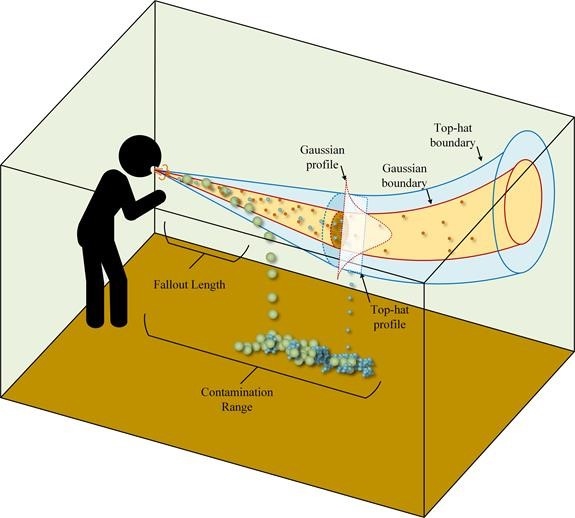Staying 2 metres apart is not enough to stop COVID-19 without masks: study
A new study by researchers from Quebec and the U.S. has found that two-metre distancing is not enough to control the spread of COVID-19 without masks.
“Mask mandates and good ventilation are critically important to curb the spread of more contagious strains of COVID-19, especially during the flu season and winter months as more people socialize indoors,” explains Saad Akhtar, a former doctoral student under the supervision of Professor Agus Sasmito at McGill University.
This comes as the Quebec government announced Tuesday an easing of restrictions in the province, including bars and restaurants no longer needing to keep a register of clients and the lifting of mandatory mask-wearing in high schools, except in common spaces and on transportation, as of Nov. 15.
According to the provincial government, 87 per cent of eligible teens aged 12 to 17 have received both doses of a COVID-19 vaccine.
THE RESEARCH
The team of researchers -- from McGill University, Université de Sherbrooke, Texas A&M University and Northern Illinois University -- developed a computer program that "accurately simulates coughing dynamics" in indoor spaces.
In the simulation, they found that wearing a mask indoors reduces the range of contamination of airborne particles by 67 per cent.
When people are unmasked, more than 70 per cent of airborne particles pass the two metres threshold within 30 seconds.
By contrast, less than one per cent of particles cross the two-metre mark if people are wearing masks.
 A new study by researchers from Quebec and the U.S. has found that two-metre distancing without masks is not enough to control the spread of COVID-19.
A new study by researchers from Quebec and the U.S. has found that two-metre distancing without masks is not enough to control the spread of COVID-19.
"While ventilation, a person’s posture and mask-wearing impacted the spread of the bio-contaminants significantly, the impact of age and gender was marginal," the study notes.
In addition, coughing remains one of the main sources of the spread of airborne viruses by symptomatic individuals.
“This study advances the understanding of how infectious particles can spread from a source to its surroundings and can help policymakers and governments make informed decisions about guidelines for masks and distancing in indoor settings,” Akhtar states.
The findings, “Implication of coughing dynamics on safe social distancing in an indoor environment — A numerical perspective,” were published in Building and Environment.
CTVNews.ca Top Stories

Poilievre suggests Trudeau is too weak to engage with Trump, Ford won't go there
While federal Conservative Leader Pierre Poilievre has taken aim at Prime Minister Justin Trudeau this week, calling him too 'weak' to engage with U.S. president-elect Donald Trump, Ontario Premier Doug Ford declined to echo the characterization in an exclusive Canadian broadcast interview set to air this Sunday on CTV's Question Period.
Man who died trying to help stranded motorist identified as Khalid Farooq, father of 5
The man who lost his life trying to help a stranded motorist Wednesday has been identified as Khalid Farooq.
W5 Investigates 'I never took part in beheadings': Canadian ISIS sniper has warning about future of terror group
An admitted Canadian ISIS sniper held in one of northeast Syria’s highest-security prisons has issued a stark warning about the potential resurgence of the terror group.
Great Lakes, Plains and Midwest forecast to be hit with snow and dangerous cold into next week
The first big snow of the season threatened to bury towns in New York along lakes Erie and Ontario during a hectic holiday travel and shopping weekend, while winter storm conditions could persist into next week and cause hazards in the Great Lakes, Plains and Midwest regions.
Are scented candles bad for you? What the science says
Concerns about the safety of candles are rooted in the chemical reactions that occur when you burn them, as well as in the artificial fragrances and colorants that contribute to the various scents you may love.
Trudeau talks border, trade in surprise dinner with Trump at Mar-a-Lago
Prime Minister Justin Trudeau discussed border security and trade during a surprise dinner with U.S.-president elect Donald Trump at Mar-a-Lago in West Palm Beach, Fla. on Friday evening, according to senior government sources.
North Korea's Kim vows steadfast support for Russia’s war in Ukraine
North Korean leader Kim Jong Un vowed his country will “invariably support” Russia’s war in Ukraine as he met Russia's defense chief, state media reported.
Montreal researchers make breakthrough discovery in fighting HIV
Researchers in Montreal have made a breakthrough discovery in HIV research by finding a way to expel the virus from its hiding places and destroy it.
'Very alarming:' Online scams spike during the holidays
Shoppers are out looking for the best deals on gifts for their loved ones. However, the RCMP and the Better Business Bureau are warning people that the deals they’re seeing online might be too good to be true.

































